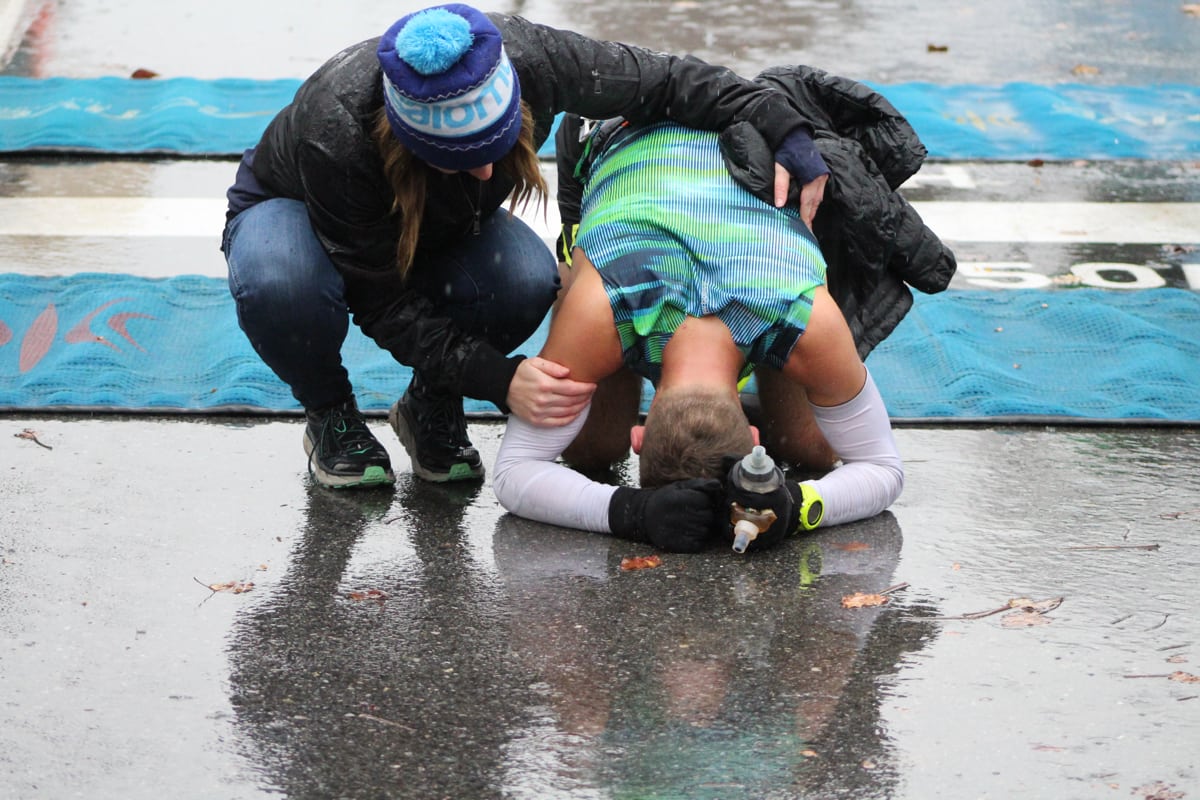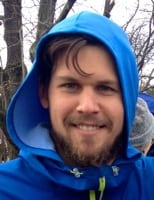Have you ever made lemonade out of lemons?
I’m not asking metaphorically. Have you ever actually cut a lemon in half and squeezed the rinds to empty the insides of every last drop of liquid? I’ve often thought—metaphorically now—that racing ultramarathons is a lot like juicing a lemon. If I’m the lemon and my potential is what’s inside, then the point of racing is to turn every ounce into lemonade, to arrive at the finish line completely hollow. There’s something oddly satisfying about actually juicing a lemon. But there’s something deeply satisfying about doing it metaphorically.
The JFK 50 Mile is a really old race. Its namesake, John F. Kennedy, wanted to improve the country’s physical fitness, and the challenge of covering 50 miles on foot led to the inception of the JFK 50 Mile in 1963—and it’s been run every year since. In the ensuing decades, many of America’s finest ultrarunners toed the line. If you look through the list of fastest times at JFK, you’ll find some recognizable names and some very fast times. I first attended the race as a handler, or crew, for Matt Flaherty in 2013, back when Zachariah Miller was the only notable Zach Miller in ultrarunning. On that storied race day in 2013, the ultrarunning world was introduced to a new Zach Miller. Around nine miles into the JFK 50 Mile, the Appalachian Trail briefly pops out of the woods and cuts through a meadow. I stood in the meadow on that brisk morning and watched a leading trio of Flaherty, Rob Krar, and Iain Ridgeway pop off the trail and into the grassy expanse, calmly navigating the terrain. Then, half a minute later, a young man badly in need of a haircut, with a backwards hat and bib number in the thousands, came charging through the meadow, huffing and puffing his way past the aid station.
“What’s your name?” inquired race director Mike Spinnler.
“I’m Zach Miller!” he bellowed.
Miller delivered a truly heroic performance that day. For hours, he kept charging, breathing like he was running a 5k. The question was not if Zach would blow up, but when he would blow up. But as the course turned from rugged, hilly singletrack to smooth, flat towpath, Ridgeway fell back while the others continued to clip off six-minute miles. Then Flaherty fell back. Late in the race, Krar, too, disappeared from the front. And Miller kept charging, and he kept breathing hard, and he kept pouring every ounce of himself into the race. Zach Miller won that year in a then-third-fastest-ever time of 5:38:40. That’s the first time I witnessed an ultrarunner making lemonade. And I wanted to do the same.
Of course, ultrarunning doesn’t need to be taken seriously, and the pain and suffering that follows from training hard and racing far is entirely synthetic and unnecessary. It’s a privilege to have the chance to push yourself to your absolute limits. But the process of making lemonade can be exceedingly gratifying when it’s pursued purposefully.
When the objective of getting the most out of yourself is taken seriously, it is a terrifying and harrowing process. You prioritize training above almost everything else. You sacrifice quality time with people you love. You go to bed earlier than you might want, and get up earlier than you might want, and run fast when you might not want to. You might run commute to and from work, get heckled by passersby as a ‘show-off’ for running with a backpack full of work clothes, and use a headlamp far too often. You will be tired most of the time. You will be hungry most of the time. You might be grumpy some of the time. In short, if, as in my case, you want to toe the line of a 50-mile race and run a very fast course as fast as you can, you have to train for a long time and you have to suffer a great deal.
Why would you do all that just to—ahem, metaphorically—make lemonade?
The entire process of training hard and racing boldly is utterly scary and decidedly painful. You have to hush every doubt you have about your abilities. You have to subdue every inclination to avoid discomfort. You have to lie to yourself and believe that you can do something you’ve never done before. When all of this is done with near perfection and you arrive at the finish line completely empty, there exists an immeasurable and indescribable feeling of satisfaction. I cannot properly describe the magnitude and depth of emotions that arise when you truly get the most out of yourself in an ultramarathon race. But there is perhaps nothing more beautiful, and perhaps no greater achievement, than the struggle to reach your maximum potential, and the satisfaction that arises when that potential is met.
I arrived at the start line of the 2017 JFK 50 Mile ready to make lemonade. I had seen it done before and I knew it was possible. I had trained tirelessly, intelligently, and vigorously. I had erased doubts and calloused my tolerance for discomfort. I was ready to run as fast as I could for 50 miles. What I did better than anything during the race was forget. As the race progressed, I forgot about the previous miles and steep climbs. As I hit the towpath and settled into a faster pace, I forgot about how long I still had to go. In the second half of the race, when I continued to lead, I refused to think about crossing the finish line. I forgot about how much I was hurting and I forgot about the people behind me. I forgot that I wanted to lay down the next time I saw my crew. I forgot about everything except the moment I was in. I allowed my potential to slowly come out of me, in a controlled manner, mile after mile, until the tank was empty and the race was finished. It went nearly perfectly. In fact, I won the race, and that result was doubtless both a surprising and supremely proud accomplishment. But when I crossed the finish line weeping, it was because I had—for the very first time—finally extracted every ounce of my ability during a race. I’ll never forget the profound feeling of fulfillment when I crossed that finish line.
I went through that long, difficult journey to arrive empty at the finish because—and forgive me for the obvious pun—the juice was worth the squeeze.
Why am I writing all of this?
I wish that everyone in this sport could experience the laborious, challenging, and fulfilling process that is metaphorically juicing a lemon. It doesn’t matter which race grabs at your heart strings and gets you to the start line, or how long it takes you to finish that race, or where you place among the field. What I hope is that you, too, will have the chance to work tirelessly for months, or even years, in an effort to get the most out of yourself for one day. Those fleeting moments after you cross the finish line, having slowly poured out all of your ability, will brighten your life forever. I hope the pursuit of—it’s still a metaphor!—making lemonade gets you out of bed to run before work tomorrow. And the next day. And the next day. I hope it inspires you to dream big, work hard, and race fearlessly. I hope this sport teaches you, as it’s taught me, that you can be a hero, if only for just one day.
Call for Comments (from Meghan)
- To continue with Eric’s analogy, have you made lemonade in trail and ultrarunning and reached your absolute potential on the day? What happened and what did it feel like for you?
- How about in the rest of life? Can you remember making lemonade at work, within family, in another hobby?

